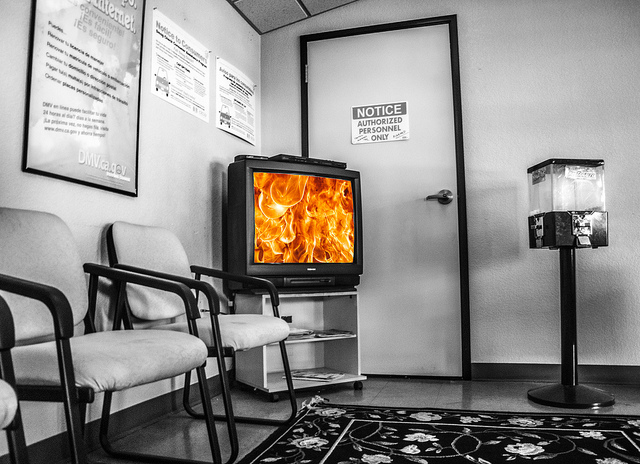Over the last couple of years, I’ve travelled around nomadically and as a result, I’ve been without a TV for a long time.
I’ve lived in ashrams, retreats, temples and camper vans and throughout this time I haven’t really missed it.
People look at me strangely when I say I don’t watch TV. They ask “what do you do?” To which I reply: “You know all those things you say you don’t have time to do? Well, I do that.”
The downside is that there are some conversations I am unable to take part in, as I don’t know any of the “celebrities” on the reality TV shows and I’m not up to date with the soap story lines but the upsides hugely outweigh this.
The biggest benefit I’ve noticed is the amount of time it gives me. It also helps keep my mind “clean;” there’s less negativity absorbed by the sorts of things we see on TV—arguments, sadness, violence. I don’t have to get annoyed at the things on TV, or the lack of things to watch. I fill my evenings with talking to friends, reading, writing, yoga, meditation, walking—all the things I enjoy doing and would not have time for if I watched TV every night.
I have experienced the benefits of mindfulness. This is being in the present and experiencing life in each moment, rather than having life pass us by whilst we’re busy distracting ourselves from what’s going on around us.
This gives me perspective and helps me see the beauty in every moment. It has given me an inner peace and happiness that comes from within and is independent of external circumstances.
To get here though, I had to spend much more time being in the “now” and experiencing real life rather than distracting myself from it. From this comes a great self awareness, an awareness of what really matters in life, how others feel and an intuition that makes life much smoother. Something I could not tap into when I was previously distracted from living in the present. It is true that sometimes we have to disconnect from technology to reconnect to ourselves and to the world around us and ultimately to what matters.
I think about what matters more: the things we watch on TV or our real life? Things like, how we feel, what our kids are up to, talking to our partner about their day, watching the sun set, taking a walk, phoning a friend, visiting an elderly neighbour. It’s these things that makes the difference to our happiness.
I can see that TV serve many purposes. It can replace the reality of our lives, and it can also make us feel better about our situations when we see others worse off. It’s also a form of entertainment in a world where we feel the need to be entertained 24/7. For some, it provides a distraction from their thoughts, their boredom or it may fill a void in life. There are many people who will switch the TV on as soon as they come in, regardless of what’s on—they like having the distraction in the background.
I find it strange that when couples have been working hard all week and not seen much of each other they say “shall we stay in tonight and Netflix something?” Surely spending time together and talking should be at the top of our list if we’ve not seen each other all week?
Now that I’m back in the real world, I often have access to a TV but rarely watch it. I will switch the news on occasionally just to check that the world hasn’t ended, but generally if something really important happens, I hear about it without TV.
The nature of much of what is on TV these days makes it no surprise to me that we have so much anger and violence in our world. What we think about impacts what plays out in our real lives. The mind absorbs things easily which is why we should care what we feed it, and especially the minds of our kids.
But it’s not all bad. TV can be a great educator; some documentaries and programmes on TV are helping spread positive messages and awareness throughout the world. It’s not TV that is the problem, rather our relationship to it.
So what actually happens when we stop watching TV?
>>> Our minds becomes clearer (full of less rubbish and negativity)
>>> We have time to do other things
>>> We spend more time in the present
>>> We have the opportunity to reconnect to ourselves, our thoughts, and how we feel
>>> We get more sleep
>>> Our relationships improve as we get to spend more time communicating with others
>>> It re-energises us and we don’t feel so lethargic
>>> We remove little annoyances: “there’s nothing to watch,” or “why do we always have to watch what you want?”
>>> We’re alleviating the well documented side effects of too much sitting
>>> We get outside more—this is good for exercise, being in nature and getting more vitamin D from the sun
If this has given you food for thought, take a look at the things you’re currently watching and consider how beneficial this may be for your mind. Or, next time you reach for the remote, think about the reasons why and if there’s anything else you’d rather be doing. Perhaps you might consider a TV free day per week and experience what else you can do with that time.
Relephant Read:
Detox Tips for a T.V. Junkie.
Author: Jess Stuart
Editor: Catherine Monkman
Photos: Robert Couse-Baker/Flickr









Read 1 comment and reply